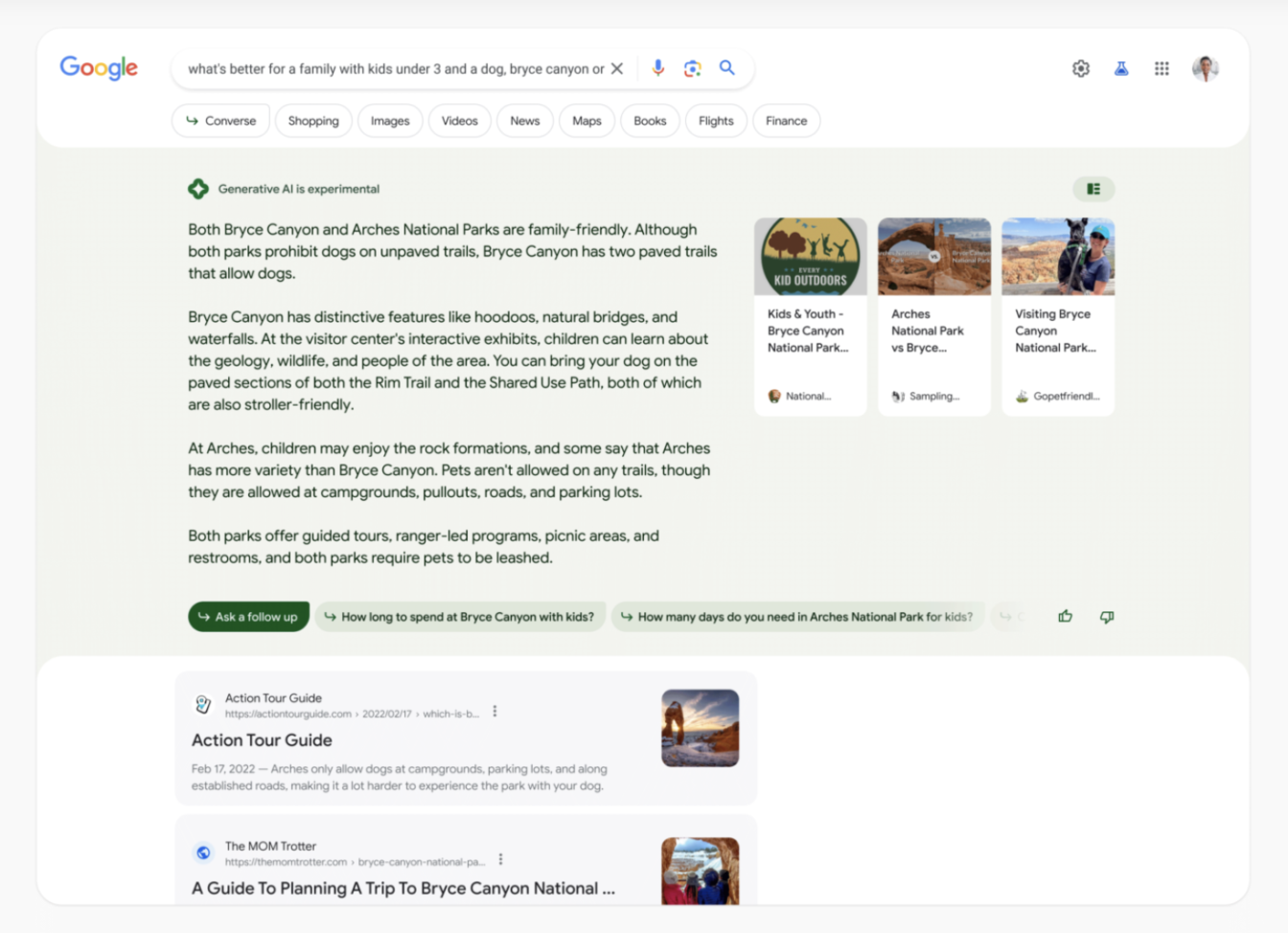Is it even possible? Feasible? …Thinkable? Could little startup Perplexity AI, with its 72 current employees, actually replace or even compete with the big bad wolf of Search: Lord Google?
I am a digital marketer. I’ve personally been using Google’s marketing products every day of the workweek for the last 10-15 years. I’ve been using Google Search since its inception. I know Google.
Let’s take a peek around the curtain, review the facts, pepper in some opinions, and squeeze out the other end of the article with a prediction for 2034.
“The Only Constant is Change” – Heraclitus
Tech evolves. Always. Perplexity AI, along with ChatGPT, has stormed into the internet search party with a high-beam flashlight. And by most people’s accord, they appeared completely out of nowhere. It’s a David versus Goliath scenario, as cliché and lame as that sounds. It’s true.
So… will Perplexity AI revolutionize our search habits? Is this truly a paradigm shift in the making? Time to dissect this battle royale one layer at a time. Let’s party.
Introducing Perplexity AI
Perplexity AI is the new kid on the block.
Perplexity is like having a chat over beers with a genius friend who knows everything. You ask it a question, and it produces an answer, along with reference links as sources. It leverages multiple LLMs like ChatGPT to use AI to fetch you the information you need without having to go to any individual web pages.
No more link-hunting marathons, pop-ups, ads, or scrolling. Just straight talk and answers. It’s a breath of fresh air in the search game.
Some have gone as far as saying that Perplexity is literally “the future of search”. Now that’s a bold statement.
Introducing Google
Google is a search engine. Have you heard of Google? If not, then stop reading right now, go over to google.com, and test it out. See what you think.
Google has been around. It’s the encyclopedia that ate the library. The search bar that burned the Yellow Pages into a pit of ash and dust. Quick, vast, reliable. Always there for you, and always watching you too.
Google Search was launched 26 years ago in 1998. Two years later, in the year 2000, it became the top search engine. Today, in 2024, Google’s market cap has soared to over 1.8 trillion dollars. That’s a trillion with a mother f*cking “T”.
Google has dominated internet search and has over 92% market share. For more than two decades, Google has been so popular and gigantic that they’ve seen nearly NO true, strong competition in the search space. None. Zero. Bing is an ant to them.
This utter lack of competition has led Google to do whatever the hell they want while they literally print money to the moon and back every single day. Once regarded as the tech darling that every college graduate was screaming their way into for employment is now largely seen as the grinning face of big tech, just another arrogant bully on the block, ready to addict and track you into their world of woke.
Why Perplexity Has a Shot at Replacing Google
A lot of us have been waiting for “a new Google”. Well, maybe not. But I sure have. That moment might be here – let’s see why it might be possible:
1. Perplexity is a New Way of Searching
Perplexity AI is…cool. It’s new. It’s changing how we search by focusing on conversations, giving direct answers, and making it easier and faster to get information. This could appeal to people who want a search experience that feels more natural and customized to them.
2. AI-First and Leverages Multiple AI Models
Perplexity AI uses multiple LLMs. For paid subscribers, you can switch between Claude, ChatGPT, Mistral, and even Google’s Gemini. With Google, they’re currently only leveraging Google’s AI. This versatility in Perplexity is nice. However, I’ll admit, I’ve never experimented with it.
3. Google Has F*cked Their User’s Privacy & Trust
Perplexity is a fresh start. A new beginning. They haven’t been sued for privacy violations yet. OpenAI…well, yeah, they already have. As for Google…Google has a long and treacherous track record of violating privacy akin to Zuckerberg.
If anyone at Google is reading this, please do better. Take privacy seriously and remember that your actions have real consequences for people around the world. If you want people to trust you, you have to give them a reason to do so.
4. A Better User Experience
Imagine the following scenario. Tell me what you would rather do. Would you rather type in your question and get your answer (Perplexity) or type in your question and scroll through a list of websites, click on them, avoid pop-ups and ads, scan through the content of the sites, and hopefully find what you’re looking for?
The choice is pretty easy. Humans have a long history of gravitating towards the easiest and fastest option. Speaking of which, how would you like to make guaranteed passive income?
Getting back to a serious note, there are of course nuances to the situation. Not every internet search is just a mission to find an objective fact. In those scenarios, experiencing a website’s content, along with its subjectivity, is what a consumer demands in such cases. A Perplexity search result, for now, can not replicate that.
5. No Ads (Yet)
Even the free version of Perplexity doesn’t have ads, or at least not yet. On the other hand, Google integrates ads into even its latest AI-enhanced search results (we’ll get to that feature later, I promise). There’s nothing wrong with advertising, although the truth is most consumers would rather avoid most of it. I’m a digital marketer but also a realist.
Why Google Could Beat Perplexity
There are plenty of reasons why Google could win this war, and it’s more than just their pile of cash.
1. Absolute Market Dominance and a 25-Year Head-Start
Google’s search engine launched 26 years ago. They have a 25-year head-start on Perplexity. They have over 92% of the search engine market share. All of this experience means they’ve already been there and done that, and they know how to navigate their way through Silicon Valley, even if their biggest business battles over the last 1-2 decades have been lawsuits.
2. Money.
Google’s financial empire is a titan among giants, boasting a market value that soars over the $1.8 trillion mark. This crazy figure is a testament to its omnipresence all around the globe. Through a diverse portfolio that spans search engines, digital advertising, online video (YouTube), and cloud technologies, Google rakes in the dough.
3. Google has More Data Than Anyone and Any Company on Earth
Google has more data than anyone. Search products need data to operate effectively. Perplexity is new and can’t even hold a candle to the mountain of data Google is sitting on.
4. Old Habits are Hard to Break. Just Google It.
“Just Perplexity it!” – Nobody…yet. Doesn’t have a ring to it either. Speaking of the name, it has four syllables. Not a great decision. But hey, at least it’s better than “Grok” or “Bard”.
“Google it” has become a universal shorthand for finding answers. People naturally resist change. They form habits. Habits are hard to break. Their current habit? To Google everything.
5. Perplexity AI is Not the Only Company Offering AI Search
Perplexity is an enticing and refreshing product, but other players are offering a similar search solution, such as YOU, Brave, and of course, Bing Copilot. Honestly though, in my opinion, Perplexity AI is the top dog at the moment. The competitors just aren’t there yet.
6. Google is Rolling Out Their New AI Search Results (SGE)

Notice the unique twist in that search result? It’s not your everyday Google page. The “new” Google can and will incorporate AI answers directly into the search results. Kind of like Perplexity, although not as good, and with fewer options (like changing LLMs, filtering your results to specific sites, using their copilot mode, etc.).
Google calls this their “Search Generative Experience”, or “SGE” for short. And it’s coming to your screen soon.
The reason this strategy is dicey for Google is that paid search ads at the top of the search results have been their money-printing machine for around two decades, and it’s where they generate the majority of their revenue.
Completely transforming that formula and experience will mean unpredictable things for Lord Google, and they better get it right from the crack of the bat.
So far, marketers, advertisers, and website owners have reacted with closed arms and middle fingers. SGE will bulldoze the entire formula that had been working pretty well for both parties, for two decades. The stakes have never been higher for Google to get this sh*t right.
Will Google Just BUY Perplexity AI to Avoid Potentially Being Replaced?
There is no evidence that Google has any plans to buy Perplexity. That doesn’t mean it won’t happen eventually, but for now, it’s not in the cards.
Does Google have enough money to buy it? Of course. That doesn’t mean it will happen, though. And Google has become increasingly arrogant over the years, so it’s possible that they still look at Perplexity AI as nothing more than a single termite on the giant brick wall around their palace. Google: please take your competition seriously and react to it by innovating.
Wait…Doesn’t Perplexity AI NEED Google to Function…?
Nope. It doesn’t. Perplexity operates independently without the need for Lord Google to operate. Perplexity AI is an independent answer engine that aims to provide direct answers sourced live from the internet without relying on Google. It uses an LLM to synthesize answers and offers links to the sites it used to create the answers.
Wrapping it up – Is Google About to Get Replaced?
So, who will win in the end? I think Perplexity AI has a better chance to replace Google than people think. However, financially speaking, it’s absolutely a long shot. So let’s be real.
Perplexity AI is here, and it will shake things up. That’s for sure. However, Google will not back down.
It’s a thrilling time for search engines. Search is “relevant” in the news again for the first time in a long time. The quest for knowledge just got more exciting.
The final verdict and my opinion is I believe Google’s market share for search will drop by at least 25% by 2034. That 25% or more will be replaced with Perplexity AI, ChatGPT, and/or other large language models.
If you enjoyed this article, please do us a huge favor and share it with everyone in your neighborhood, workplace, school, and local AA meeting.

